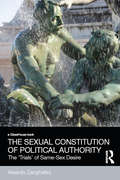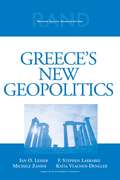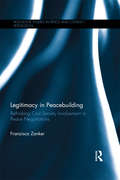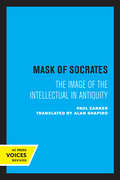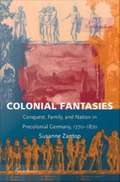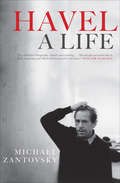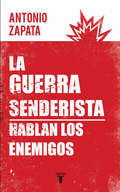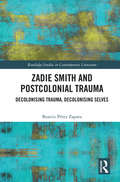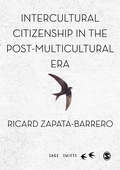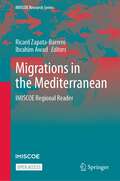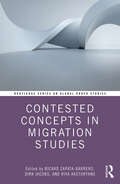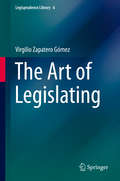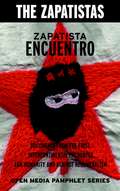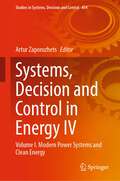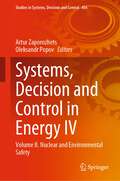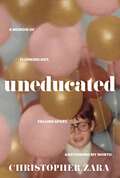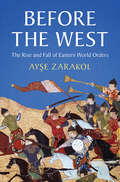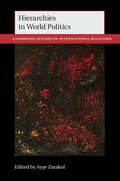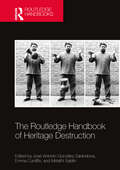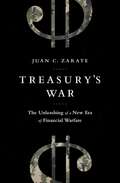- Table View
- List View
The Sexual Constitution of Political Authority: The 'Trials' of Same-Sex Desire (Social Justice)
by Aleardo ZanghelliniWhile there is no shortage of studies addressing the state’s regulation of the sexual, research into the ways in which the sexual governs the state and its attributes is still in its infancy. The Sexual Constitution of Political Authority argues that there are good reasons to suppose that our understandings of state power quiver with erotic undercurrents. The book maintains, more specifically, that the relationship between ideas of political authority and male same-sex desire is especially fraught. Through a series of case studies where a statesman’s same-sex desire was put on trial (either literally or metaphorically) as a problem for the good exercise of public powers, the book shows the resilience and adaptability of cultural beliefs in the incompatibility between public office and male same-sex desire. Some of the case studies analysed are familiar ground for both political/constitutional history and the history of sexuality. The Sexual Constitution of Political Authority argues, however, that only by systematically reading questions of institutional politics and questions of sexuality through each other will we have access to the most interesting insights that a study of these trials can generate. Whether they involve obscure public officials or iconic rulers such as Hadrian and James I, these compelling fragments of queer history reveal that the disavowal of male same-sex desire has been, and partly remains, central to mainstream understandings of political authority.
Greece's New Geopolitics
by Michele Zanini Katia Vlachos F. Stephen Larrabee Ian O. LesserGreece has been profoundly affected by recent changes in the international environment, on its borders, and within the country itself. Many long-standing assumptions about Greek interests and Greece's role have fallen away and have been supplanted by new approaches. The country has become progressively more modern and more European, and its international policy has become more sophisticated. At the same time, the geopolitical scene has evolved in ways that present new challenges and new opportunities for Athens in its relations with Europe, the United States, and neighboring countries. Many of these challenges cross traditional regional boundaries and underscore Greece's potential to play a transregional role, looking outward from Europe to the Mediterranean, Eurasia, and the Middle East. This report explores the new geopolitical environment Greece faces, paying special attention to the implications for southeastern Europe and transatlantic relations; explores options for Greek strategy; and offers some new directions for policy in Greece and on both sides of the Atlantic.
Clash or Cooperation of Civilizations?: Overlapping Integration and Identities (The International Political Economy of New Regionalisms Series)
by Wolfgang ZankFor decades North Africa and the Middle East have experienced overlapping identities and integration processes. With the exception of Morocco, the countries of North Africa have supported the re-launch of pan-Africanism in the form of the African Union and its growing institutionalization; but they also share an Arab identity and are members of the Arab League. Islamism commands wide support among the regions of North Africa and the Middle East, and the impact of European integration can increasingly be seen in varying forms. This comprehensive volume focuses on overlapping identities and integration processes in the Mediterranean basin and queries to what extent these various identities and integration processes are compatible or in conflict. Incorporating both theoretical and empirical material, it unites contributions from a variety of countries, thus exploring these issues from different perspectives.
Legitimacy in Peacebuilding: Rethinking Civil Society Involvement in Peace Negotiations (Routledge Studies in Peace and Conflict Resolution)
by Franzisca ZankerThe book offers a critical analysis of legitimacy in peacebuilding, with a focus on peace negotiations and civil society participation in particular. The aim of this book is to unpack the meaning of legitimacy for the population in peacebuilding processes and the relationship this has with civil society involvement. There is a growing consensus for addressing local concerns in peacebuilding, with the aim of ensuring local ownership. Moreover, scholars have noted a relationship between civil society inclusion in peace negotiations and legitimacy. Yet, the very idea of legitimacy remains a black box. Using data from original empirical fieldwork – including over 100 semi-structured interviews and 12 focus group discussions – the book focuses on two case studies of negotiations that, respectively, ended a long civil war in Liberia in 2003 and ended the post-election violence in Kenya in 2008. It argues that civil society involvement is conceptually insufficient to show a multidimensional understanding of legitimacy. Instead, the book shows a complex picture of legitimate peace negotiations, based on outcome and participation-based characteristics with the involvement of both ‘guarantors’ of legitimacy and a more general civic agency which includes the general population. Through forms of participative communication, the passive audience become active stakeholders in the construction of legitimacy. This has repercussions for how we think about civil society and peacebuilding more generally. This book will be of much interest to students of peacebuilding, conflict resolution, security studies and IR in general.
The Mask of Socrates: The Image of the Intellectual in Antiquity (Sather Classical Lectures #59)
by Paul ZankerThis richly illustrated work provides a new and deeper perspective on the interaction of visual representation and classical culture from the fifth century B.C. to the fourth century A.D. Drawing on a variety of source materials, including Greco-Roman literature, historiography, and philosophy, coupled with artistic renderings, Paul Zanker forges the first comprehensive history of the visual representation of Greek and Roman intellectuals. He takes the reader from the earliest visual images of Socrates and Plato to the figures of Christ, the Apostles, and contemporaneous pagan and civic dignitaries. Through his interpretations of the postures, gestures, facial expressions, and stylistic changes of particular pieces, we come to know these great poets and philosophers through all of their various personas—the prophetic wise man, the virtuous democratic citizen, or the self-absorbed bon vivant. Zanker's analysis of how the iconography of influential thinkers and writers changed demonstrates the rise and fall of trends and the movement of schools of thought and belief, each successively embodying the most valued characteristics of the period and culture. This title is part of UC Press's Voices Revived program, which commemorates University of California Press’s mission to seek out and cultivate the brightest minds and give them voice, reach, and impact. Drawing on a backlist dating to 1893, Voices Revived makes high-quality, peer-reviewed scholarship accessible once again using print-on-demand technology. This title was originally published in 1995.
Ontological Entanglements, Agency and Ethics in International Relations: Exploring the Crossroads (Interventions)
by Laura ZanottiWhile the relevance of ontological commitments for epistemology and methodology in International Relations have been the subject of growing debate for several years, the implications for ethics and political agency of embracing an ontology of entanglement have remained unexplored. This work focuses on the importance of addressing the ontological and epistemological assumptions of the discipline of International Relations. There is increased awareness of the limits of abstract principles as ways of adjudicating real life political and ethical choices regarding International Intervention and international development for both practitioners and scholars. The work challenges IR prevailing ontological imaginaries rooted upon Newtonian physics and argues that non-substantialist ontological positions nurture a political ethos that privileges ‘modest’ engagements of practical solidarity and weights political choices with regard to the consequences and distributive effects they may produce in the context where they are made rather than based upon their universal normative aspirations. While the book is firmly rooted in metatheory, Zanotti also highlights the easiness with which political failures are dismissed as unintended consequences and argues that the current crisis in Syria, and genocides in Srebrenica and Rwanda have shown that advocating abstract ethical principles, be they the Responsibility to Protect, impartiality, or following rules can lead to disaster and can foster violent and exclusionary practices. She also exemplifies how an alternative ethos can be practiced through the example of an international NGO in Haiti. Highlighting the need for critically re-thinking the way we conceptualize political agency and validate ethics, this work will be of interest to scholars of International Relations theory, ethics and critical security studies.
Colonial Fantasies: Conquest, Family, and Nation in Precolonial Germany, 1770-1870
by Susanne ZantopSince Germany became a colonial power relatively late, postcolonial theorists and histories of colonialism have thus far paid little attention to it. Uncovering Germany's colonial legacy and imagination, Susanne Zantop reveals the significance of colonial fantasies--a kind of colonialism without colonies--in the formation of German national identity. Through readings of historical, anthropological, literary, and popular texts, Zantop explores imaginary colonial encounters of "Germans" with "natives" in late-eighteenth- and early-nineteenth-century literature, and shows how these colonial fantasies acted as a rehearsal for actual colonial ventures in Africa, South America, and the Pacific. From as early as the sixteenth century, Germans preoccupied themselves with an imaginary drive for colonial conquest and possession that eventually grew into a collective obsession. Zantop illustrates the gendered character of Germany's colonial imagination through critical readings of popular novels, plays, and travel literature that imagine sexual conquest and surrender in colonial territory--or love and blissful domestic relations between colonizer and colonized. She looks at scientific articles, philosophical essays, and political pamphlets that helped create a racist colonial discourse and demonstrates that from its earliest manifestations, the German colonial imagination contained ideas about a specifically German national identity, different from, if not superior to, most others.
Havel: A Life
by Michael ZantovskyVáclav Havel was one of the most prominent figures of the twentieth century: iconoclast and intellectual, renowned playwright turned political dissident, president of a united then divided nation, and dedicated human rights activist. Written by Michael Zantovsky-Havel’s former press secretary, advisor, and longtime friend-Havel: A Life presents a revelatory portrait of this giant among men and the turbulent times through which he prevailed.Havel’s lifelong perspective as an outsider began with his privileged childhood in Prague and his family’s blacklisted status following the Communist coup of 1948. This feeling of being outcast fueled his career as an essayist and dramatist, writing absurdist plays as social commentary. His involvement during the Prague Spring and his leadership of Charter 77, his unflagging belief in the power of the powerless, and his galvanizing personality catapulted Havel into a pivotal role as the leader of the Velvet Revolution in 1989. Although Havel was a courageous visionary, he was also a man of great contradictions, wracked with doubt and self-criticism. But he always remained true to himself. Over the next thirteen years, he continued to break through international barriers as the last president of Czechoslovakia and the first president of the Czech Republic.
La guerra senderista: Hablan los enemigos
by Antonio Zapata"Elena Yparraguirre concibe la militancia partidiaria con un orgullo especial, porque siente que participa en una organización con propósito en esta vida. Cree que hay un parecido con las organizaciones religiosas, pero siempre y cuando se entienda que en la militancia marxista el punto de partida invierte la explicación fundamental sobre el mundo y la vida." En este libro se cuentan dos historias. La primera es una historia general de la guerra interna. Antonio Zapata cuenta, con rigor histórico y pulso narrativo, desde el germen político que provocó las distintas escisiones del comunismo peruano en los años sesenta, hasta el derrumbe final de Sendero Luminoso con la captura de Guzmán. Para hacerlo se enfoca principalmente en quienes tomaron las principales decisiones, los actores armados: por un lado las Fuerzas Armadas y la Policía Nacional, a través de sus memorias institucionales u oficiosas, y por otro Sendero Luminoso, a través de testimonios hasta hoy inéditos de sus cabecillas. Aquí se encuentra la segunda historia: la guerra vista desde los ojos de Elena Yparraguirre. Condenada a cadena perpetua por terrorismo, la número 3 de Sendero Luminoso quería ser monja de niña, pero la muerte de su hermana mayor hizo que abandonase la fe. Tiempo después, tras vivir cuatro años en París, regresó al Perú junto a su familia a vivir en un cómodo departamento en San Isidro. Pero Yparraguirre abandonó esa vida por una nueva religión: el maoísmo en su versión más extrema. Si Guzmán fue el ideólogo de Sendero, Yparraguirre fue la organizadora: una mujer dura y eficiente que organizó lo más cercano que tuvo el Perú a una máquina de matar. Sin ella, "Sendero hubiera sido menos letal", dice Zapata, quien para realizar esta investigación se reunió 21 veces con la número 3 de Sendero Luminoso en el Penal de Mujeres de Chorrillos.
Zadie Smith and Postcolonial Trauma: Decolonising Trauma, Decolonising Selves (Routledge Studies in Contemporary Literature)
by Beatriz Pérez ZapataThis monograph analyses Zadie Smith’s White Teeth, On Beauty, NW, The Embassy of Cambodia, and Swing Time as trauma fictions that reveal the social, cultural, historical, and political facets of trauma. Starting with Smith’s humorous critique of psychoanalysis and her definition of original trauma, this volume explores Smith’s challenge of Western theories of trauma and coping and how her narratives expose the insidiousness of (post)colonial suffering and unbelonging. This book then explores transgenerational trauma, the tensions between remembering and forgetting, multidirectional memory, and the possibilities of the ambiguities and contradictions of the postcolonial and diasporic characters Smith depicts. This analysis discloses Smith’s effort to ethically redefine trauma theory from a postcolonial and decolonial standpoint, reiterate the need to acknowledge and work through colonial histories and postcolonial forms of oppression, and critically reflect on our roles as witnesses of suffering in global times.
Changó, Decolonizing the African Diaspora (Decolonizing the Classics)
by Manuel Zapata OlivellaThe crowning achievement of Afro-Colombian author Manuel Zapata Olivella, Changó, Decolonizing the African Diaspora depicts the African American experience from a perspective of gods who stand over the world and watch. The centennial anniversary release of this ground-breaking postcolonial text remains a passionate tour de force to make sense of our past, present, and future. A new introduction by Professor William Luis positions the book in contemporary politics and reasserts this book’s importance in Afro-Spanish American literature. Ranging from Brazil to New England but centered in the Caribbean, where countless slaves once arrived from West Africa, this book recounts scenes from four centuries of involuntary displacement and servitude of the muntu, the people. Through the voices of Benkos Biojo in Colombia, Henri Christophe in Haiti, Simon Bolivar in Venezuela, Jose Maria Morelos in Mexico, the Aleijadinho in Brazil, or Malcolm X in Harlem, Zapata Olivella conveys, in luminous verse and prose, the breadth of heroism, betrayal, and suffering common to the history of people of African descent in the Western hemisphere. Readers and critics of postcolonial literatures will relish the opportunity to experience Zapata Olivella's masterpiece in English; students of world cultures will appreciate this extraordinary tapestry, woven from equal strands of myth and history.
Intercultural Citizenship in the Post-Multicultural Era (SAGE Swifts)
by Ricard Zapata-BarreroThis book explores the intercultural policy paradigm emerging within diversity and migration studies. Drawing on empirical studies of cultural diversity and placing a focus on the current crises of identity in Europe, Zapata-Barrero argues for an intercultural model of citizenship that prioritises contact between diverse people. In looking forward to a post-multicultural era, his analysis suggests how we can better manage the challenges presented by our increasingly complex, multifaceted societies. This thoughtful text will appeal to students and scholars across politics, sociology, anthropology and social psychology, as well as policy makers and social entrepreneurs around the world grappling with issues around migration, diversity and citizenship. Ricard Zapata-Barrero is a Professor of Political and Social Sciences at the Universitat Pompeu Fabra. He is also Director of the Interdisciplinary Research Group on Immigration at UPF, on the Board of Directors for IMISCOE, an expert on the Intercultural Cities Program, and founded the Intercultural Cities Network in Spain in 2014. Additionally, he is a Compendium expert within the Council of Europe.
Intercultural Citizenship in the Post-Multicultural Era (SAGE Swifts)
by Ricard Zapata-BarreroThis book explores the intercultural policy paradigm emerging within diversity and migration studies. Drawing on empirical studies of cultural diversity and placing a focus on the current crises of identity in Europe, Zapata-Barrero argues for an intercultural model of citizenship that prioritises contact between diverse people. In looking forward to a post-multicultural era, his analysis suggests how we can better manage the challenges presented by our increasingly complex, multifaceted societies. This thoughtful text will appeal to students and scholars across politics, sociology, anthropology and social psychology, as well as policy makers and social entrepreneurs around the world grappling with issues around migration, diversity and citizenship. Ricard Zapata-Barrero is a Professor of Political and Social Sciences at the Universitat Pompeu Fabra. He is also Director of the Interdisciplinary Research Group on Immigration at UPF, on the Board of Directors for IMISCOE, an expert on the Intercultural Cities Program, and founded the Intercultural Cities Network in Spain in 2014. Additionally, he is a Compendium expert within the Council of Europe.
Migrations in the Mediterranean: IMISCOE Regional Reader (IMISCOE Research Series)
by Ricard Zapata-Barrero Ibrahim AwadThis open access Regional Reader describes population movement circulating within the Mediterranean area, for any reason or from any region, be them European, African, Asian or originating from any of the Mediterranean shores. It showcases a plurality of approaches to and applications of Mediterranean migration, contributing to a regional approach to migration studies, thereby defending this regional approach by scaling Mediterranean migration issues. This book covers a large set of questions related Mediterranean migrations to the migration research agenda, such as: market and economy, politics and policies, super-diversity and intersectionality, media, society, welfare and the environment through five main parts: Geo-political Mediterranean Relations, Governance, Policies and Politics, Mobility drivers and Agency, Cities, History and Social Transformations, and Economy and Labour Markets. This Regional Reader provides an interesting read to scholars, researchers, but also policy makers and civil society organizations’ high representatives, international foundations and institutions interested in linking the Mediterranean and migration.
Contested Concepts in Migration Studies (Routledge Series on Global Order Studies)
by Ricard Zapata-Barrero Riva Kastoryano Dirk JacobsThis volume demonstrates that migration- and diversity-related concepts are always contested, and provides a reflexive critical awareness and better comprehension of the complex questions driving migration studies. The main purpose of this volume is to enhance conceptual thinking on migration studies. Examining interaction between concepts in the public domain, the academic disciplines, and the policy field, this book helps to avoid simplification or even trivialization of complex issues. Recent political events question established ways of looking at issues of migration and diversity and require a clarification or reinvention of political concepts to match the changing world. Applying five basic dimensions, each expert chapter contribution reflects on the role concepts play and demonstrates that concepts are ideology dependent, policy/politics dependent, context dependent, discipline dependent, and language dependent, and are influenced by how research is done, how policies are formulated, and how political debates extend and distort them. This book will be essential reading for students, scholars, and practitioners in migration studies/politics, migrant integration, citizenship studies, racism studies, and more broadly of key interest to sociology, political science, and political theory.
The Art of Legislating (Legisprudence Library #6)
by Virgilio Zapatero GómezAny contemporary state presents itself as committed to the “rule of law”, and this notion is perhaps the most powerful political ideal within the current global discourse on legal and political institutions. Despite being a contested concept, the rule of law is generally recognised as meaning that government is bound in all its actions by fixed and public rules, and that these rules respect certain formal requirements and are enforced by an independent judiciary. This book focuses on formal legality and the question of how to achieve good laws—a topic that was famously addressed by the 18th century enlightened thinkers, but also by prominent legal scholars of our time. Historically, the canon of “good legislation” demanded generality, publicity and accessibility, and comprehensibility of laws; non-retroactivity; consistency; the possibility of complying with legal obligations and prohibitions; stability; and congruency between enacted laws and their application. All these are valuable ideals that should not be abandoned in today’s legal systems, particularly in view of the silent revolution that is transforming our legality-based “states of law” into jurisdictional states. Such ideals are still worth pursuing for those who believe in representative democracy, in the rule of law and in the dignity of legislation. The idea for the book stemmed from the author’s parliamentary and governmental experience; he was responsible for the Government of Spain’s legislative co-ordination from 1982 to 1993, which were years of intensive legislative production. The more than five hundred laws (and thousands of decrees) elaborated in this period profoundly changed all sectors of the legal order inherited from Franco’s dictatorship, and laid the foundations of a new social and democratic system. For an academic, this was an exciting experience, which offered a unique opportunity to put the theory of legislation to the test. Reflecting and elaborating on this experience, the book not only increases scholarly awareness of how laws are made, but above all, improves the quality of legislation and as a result the rule of law.
Zapatista Encuentro: Documents from the Encounter for Humanity and Against Neoliberalism, La Realidad, Mexico (Open Media Series)
by Zapatistas"Why is everyone so quiet? Is this the democracy you wanted?" So ask the Zapatistas, the group of indigenous Mexicans who, on January 1, 1994, mounted a rebellion against the implementation of NAFTA, political corruption, and the slow, unreported genocide of indigenous people worldwide. As the group expressed their demands and revealed their tactics, it quickly became obvious that they were less an armed guerrilla force seeking to seize state power, and much more a social movement seeking to catalyze civil society's full democratic power. For this reason Mexican political analyst Gustava Esteva has called the Zapatista rebellion "the first revolution of the 21st century." He explains that whereas the revolutions of the 20th century were tests for state power, the Zapatista struggle was for greater local autonomy, economic justice, and political rights within the borders of their own communities. Zapatista Encuentro contains documents and communiqués from Subcomandante Marcos - the leader of the Zapatistas - from the 1996 Encounter for Humanity and Against Neoliberalism. This remarkable event brought together 5,000 activists from all over the world to discuss how globalization (neoliberalism) affects us politically, culturally, economically, and socially.
Stromspeicher und Power-to-Gas im deutschen Energiesystem: Rahmenbedingungen, Bedarf und Einsatzmöglichkeiten
by Martin ZapfDieses Fachbuch gibt Aufschluss über die Grundzüge des deutschen Stromsystems und geht auf aktuelle Entwicklungen ein. Unter Berücksichtigung zahlreicher beeinflussender Faktoren und eines Literaturreviews wird der Stromspeicherbedarf in Deutschland abgeschätzt und zusammen mit Berechnungen zu Stromspeicherkosten ausgewählte Technologien beurteilt. In diesem Rahmen wird die aktuelle Gesetzeslage sowie die Netzdienlichkeit bzw. Netzverträglichkeit von Stromspeichern beleuchtet. Power-to-Gas inkl. der vorhandenen Erdgasinfrastruktur ist ein eigenes Kapitel gewidmet. Letztlich werden die Potenziale synthetischer Gase im Verkehrsektor aufgezeigt sowie die Erdgas- und Elektromobilität gegenübergestellt.
Systems, Decision and Control in Energy IV: Volume I. Modern Power Systems and Clean Energy (Studies in Systems, Decision and Control #454)
by Artur ZaporozhetsThe concept of "energy" includes methods for obtaining and using various types of energy for the needs of human society. Energy is one of the foundations for the development of modern society. The effectiveness of solving social, economic and technical problems, as well as the anthropogenic transformations of nature, is largely determined by energy production and the scale of energy production.Modern energy is not a separate industry, but it penetrates widely into other areas, in particular, chemical, transport, aerospace, construction, metallurgy, engineering, agriculture, etc. The energy sector is based on complex technical systems that are multicomponent, spatially distributed systems that during their operation are affected to a wide range of design and non-design thermomechanical loading conditions, the effects of aggressive fields and units, unauthorized influences (operator errors, terrorism, sabotage) and can reach various limit states.Complex technical systems are characterized by complex non-linear interactions between their constituent elements, complex chains (scenarios) of cause-effect relationships between hazardous, probabilistic events and processes that occur during their life. These scenarios can be implemented over complex ramified scenario trees.Ensuring the operational reliability, durability and safety of power equipment is a difficult task, which is associated with the organization of the reliability of control over the operation of power plants and ensuring optimal conditions for their operation. In this regard, we can distinguish a whole class of tasks related to the development of control systems, diagnostics and monitoring in the energy industry, which are presented in this book. Of particular relevance now is the use of UAVs in the energy sector.Particular attention must be paid to the environmental consequences of the operation of energy facilities, the main of which is significant environmental pollution in large cities and industrial areas.The development of environmental management information systems is the prerogative of the state, corporations and one of the main directions of the national informatization policy. A clearly debugged system of environmental monitoring gives a general idea of the features of the current ecological state, the main directions of state policy in the field of environmental protection, the use of natural resources and environmental safety. The methodology and hardware-software tools for monitoring the state of the environment presented in the monograph are effective tools for supporting decision-making in managing the environmental safety of the atmosphere during its technogenic pollution.
Systems, Decision and Control in Energy IV: Volume IІ. Nuclear and Environmental Safety (Studies in Systems, Decision and Control #456)
by Artur Zaporozhets Oleksandr PopovIn recent years, the scale of environmental hazards has been growing, emergencies occur more often at special facilities, in particular nuclear power, the largest of which was the accident at the Chernobyl nuclear power plant in Ukraine on April 26, 1986. With the advent of nuclear power, it was believed that nuclear power reactors were safe enough, control and monitoring systems, protective screens and trained personnel would guarantee their trouble-free operation. There is also a trend now that nuclear power is "environmentally friendly" because it provides a reduction in greenhouse gas emissions with replacing power plants working on fossil fuels. Some countries, such as the United States, have recently classified nuclear energy as a renewable energy source. Despite this, nuclear power is potentially dangerous due to: - possible accidents at power plants, accompanied by the ejection of radioactive materials into the environment; - ejections of about 250 radioactive isotopes into the environment as a result of the operation of nuclear reactors; - emissions of 85Kr, which changes the electrical conductivity of the atmosphere. This gas behaves like a greenhouse gas in the atmosphere, thereby contributing to anthropogenic climate change on Earth; - pollution of the biosphere with plutonium; - radioactive waste is the most important cause of environmental hazard, which remains unresolved. Civilian nuclear power reactors operating throughout the world annually generate large amounts of low-, medium- and high-level radioactive waste. Radioactive pollution accompanies all parts of the complex production of nuclear energy: the extraction and processing of uranium, the operation of nuclear power plants, the storage and regeneration of fuel, which has a significant impact on the environmental friendliness of nuclear energy. In addition, up to 300 natural and technogenic emergencies are registered annually, as a result of which people die and great economic damage is caused. The main reasons for the occurrence of technogenic accidents and catastrophes and the strengthening of the negative impact due to the occurrence of natural and technogenic emergencies in Ukraine are: obsolete fixed assets, in particular for environmental purposes; large volume of transportation, storage and use of hazardous substances; the emergency state of a significant part of public utility networks; insufficient investment support for the process of introducing the latest resource-saving and environmentally friendly technologies in environmentally hazardous industries, primarily in the metallurgical, chemical, petrochemical and energy sectors; environmental problems associated with significant changes in the state of the geological and hydrogeological environment and caused by the closure of unprofitable mining enterprises and mines; unwillingness of economic subjects to take measures to prevent accidents and catastrophes at high-risk and potentially hazardous facilities.
Uneducated: A Memoir of Flunking Out, Falling Apart, and Finding My Worth
by Christopher ZaraIn this &“hilarious and heartbreaking...must-read memoir&” (Publishers Weekly), Christopher Zara breaks down his winding journey from dropout to journalist and the impact that his background had in the world of privilege. Boldly honest, wryly funny, and utterly open-hearted, Uneducated is one diploma-less journalist&’s map of our growing educational divide and, ultimately, a challenge: in our credential-obsessed world, what is the true value of a college degree? For Christopher Zara, this is the professional minefield he has had to navigate since the day he was kicked out of his New Jersey high school for behavioral problems and never allowed back. From a school for &“troubled kids,&” to wrestling with his identity in the burgeoning punk scene of the 1980s; from a stint as an ice cream scooper as he got clean in Florida, to an unpaid internship in New York in his thirties, Zara spent years contending with skeptical hiring managers and his own impostor syndrome before breaking into the world of journalism—only to be met by an industry preoccupied with pedigree. As he navigated the world of the elite and saw the realities of the education gap firsthand, Zara realized he needed to confront the label he had been quietly holding in: what it looked like to be part of the &“working class&”—whatever that meant.Book Riot's Eight New Nonfiction Books to Read in May Book Browse's Best Books of May 2023
Before the West: The Rise and Fall of Eastern World Orders (LSE International Studies)
by Ayşe ZarakolHow would the history of international relations in 'the East' be written if we did not always read the ending – the Rise of the West and the decline of the East – into the past? What if we did not assume that Asia was just a residual category, a variant of 'not-Europe', but saw it as a space of with its own particular history and sociopolitical dynamics, not defined only by encounters with European colonialism? How would our understanding of sovereignty, as well as our theories about the causes of the decline of Great Powers and international orders, change as a result? For the first time, Before the West offers a grand narrative of (Eur)Asia as a space connected by normatively and institutionally overlapping successive world orders originating from the Mongol Empire. It also uses that history to rethink the foundational concepts and debates of international relations, such as order and decline.
Cambridge Studies in International Relations 144: Hierarchies in World Politics (Cambridge Studies in International Relations #144)
by Ayşe ZarakolGlobalizing processes are gathering increased attention for complicating the nature of political boundaries, authority and sovereignty. Recent examples of global financial and political turmoil have also created a sense of unease about the durability of the modern international order and the ability of our existing theoretical frameworks to explain system dynamics. In light of the inadequacies of traditional international relation (IR) theories in explaining the contemporary global context, a growing range of scholars have been seeking to make sense of world politics through an analytical focus on hierarchies instead. Until now, the explanatory potential of such research agendas and their implications for the discipline went unrecognized, partly due to the fragmented nature of the IR field. To address this gap, this ground-breaking book brings leading IR scholars together in a conversation on hierarchy and thus moves the discipline in a direction better equipped to deal with the challenges of the twenty-first century.
The Routledge Handbook of Heritage Destruction (Routledge Handbooks on Museums, Galleries and Heritage)
by Zarandona, José Antonio González Emma Cunliffe Melathi SaldinThe Routledge Handbook of Heritage Destruction presents a comprehensive view on the destruction of cultural heritage and offers insights into this multifaceted, interdisciplinary phenomenon; the methods scholars have used to study it; and the results these various methods have produced. By juxtaposing theoretical and legal frameworks and conceptual contexts alongside a wide distribution of geographical and temporal case studies, this book throws light upon the risks, and the realizations, of art and heritage destruction. Exploring the variety of forces that drive the destruction of heritage, the volume also contains contributions that consider what forms heritage destruction takes and in which contexts and circumstances it manifests. Contributors, including local scholars, also consider how these drivers and contexts change, and what effect this has on heritage destruction, and how we conceptualise it. Overall, the book establishes the importance of the need to study the destruction of art and cultural heritage within a wider framework that encompasses not only theory but also legal, military, social, and ontological issues. The Routledge Handbook of Heritage Destruction will contribute to the development of a more complete understanding and analysis of heritage destruction. The Handbook will be useful to academics, students, and professionals with interest in heritage, conservation and preservation, history and art history, archaeology, anthropology, philosophy, and law.
Treasury's War: The Unleashing of a New Era of Financial Warfare
by Juan C. ZarateFor more than a decade, America has been waging a new kind of war against the financial networks of rogue regimes, proliferators, terrorist groups, and criminal syndicates. Juan Zarate, a chief architect of modern financial warfare and a former senior Treasury and White House official, pulls back the curtain on this shadowy world. In this gripping story, he explains in unprecedented detail how a small, dedicated group of officials redefined the Treasury’s role and used its unique powers, relationships, and reputation to apply financial pressure against America’s enemies. This group unleashed a new brand of financial power--one that leveraged the private sector and banks directly to isolate rogues from the international financial system. By harnessing the forces of globalization and the centrality of the American market and dollar, Treasury developed a new way of undermining America’s foes. Treasury and its tools soon became, and remain, critical in the most vital geopolitical challenges facing the United States, including terrorism, nuclear proliferation, and the regimes in Iran, North Korea, and Syria. This book is the definitive account, by an unparalleled expert, of how financial warfare has taken pride of place in American foreign policy and how America’s competitors and enemies are now learning to use this type of power themselves. This is the unique story of the United States’ financial war campaigns and the contours and uses of financial power, and of the warfare to come.
